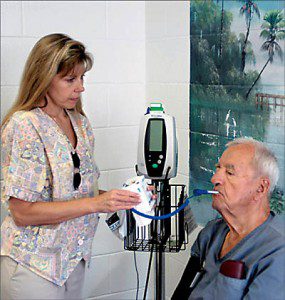With opponents arguing that lawmakers can’t make such changes in the “recesses of the budget,” a Leon County circuit judge heard arguments Tuesday about the constitutionality of a plan to contract with private companies for prison health services.

Judge Kevin Carroll, who held a two-hour hearing, did not give a specific time when he will rule but indicated a decision might come early next week. The Florida Nurses Association and a state-employees union are challenging a legislative move last year to privatize health care at prisons throughout Florida.
The case centers on a decision by legislative leaders to include the move in budget fine print known as “proviso” language. The opponents say such policy decisions need to be made by changing state law, not including them in the budget.
“It needs to be debated back and forth, the pros and cons,” said Thomas Brooks, an attorney for the union, the American Federation of State, County and Municipal Employees.
But Jonathan Glogau, chief of complex litigation in the Attorney General’s Office, said lawmakers could use proviso language in privatizing health services. He said the key is that the proviso language must be “directly and rationally” related to the part of the budget it carries out — in this case, inmate health care.
“Here’s a pot of money for prison health care,” Glogau said at one point, describing the relationship. “Here’s how to spend it.”
Carroll asked some questions during the hearing but did not hint how he will rule. He emphasized, however, that he will look only at the legal issues — not the broader controversy about whether it is wise for lawmakers to turn over prison health care to private companies.
“It’s clearly not my job (to decide the wisdom),” said Carroll, who added he expects his ruling to be appealed.
The hearing came almost exactly a month before the 1st District Court of Appeal is scheduled to listen to arguments about another legislative plan to privatize 29 prison facilities across the southern part of the state. Circuit Judge Jackie Fulford last year ruled that the plan, which also was included in proviso language in the 2011-12 budget, was unconstitutional.
Privatization is a hotly debated issue, in part, because state employees fear they will lose jobs or see pay or benefit cuts if contractors provide public services. Two licensed-practical nurses who work in the prison system are named plaintiffs in the case argued Tuesday.
The health-care proviso directed the Department of Corrections to seek proposals from companies and called for privatization to lead to cost savings of at least 7 percent for the state, compared to 2009-10 expenses. The process led to the department recommending that Corizon, Inc., receive a contract for prisons in North and Central Florida, and that Wexford Health Sources receive a contract in South Florida.
A heavily debated issue in the lawsuit is whether state law already gave the Department of Corrections the authority to privatize health services, regardless of the proviso language. Glogau said the department has the authority and had already completed a business plan for privatization of the services before lawmakers started the 2011 session.
But M. Stephen Turner, an attorney for the Florida Nurses Association, described the potential contracting as “proviso-driven procurement.”
“The department’s discretion is not being exercised,” Turner said. “It is the proviso that is being followed.”
by Jim Saunders


